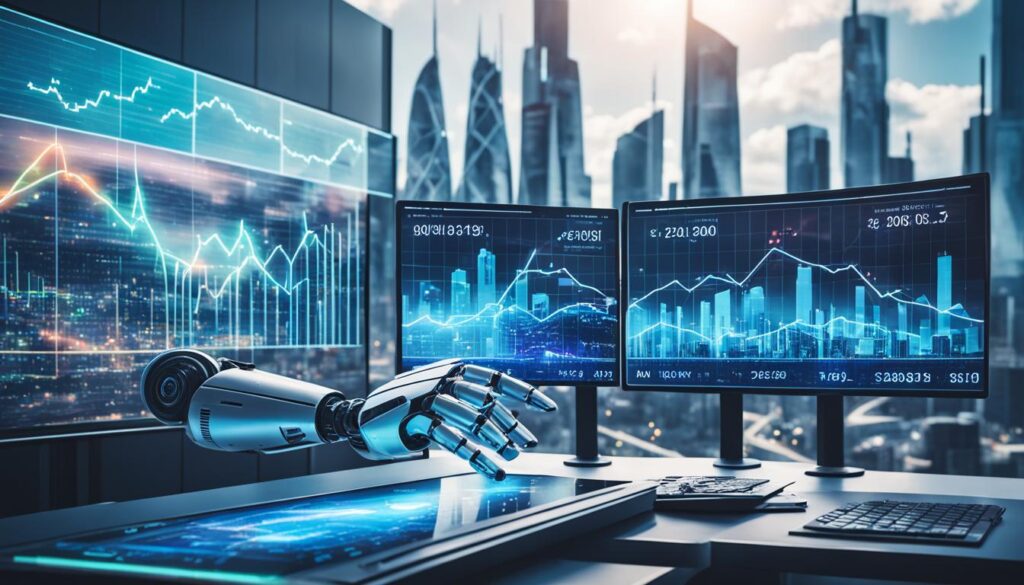Artificial intelligence (AI) is no longer a futuristic concept—it’s already shaping how we live, work, and make decisions every day. From smart recommendations on streaming platforms to AI-powered tools used by doctors, teachers, and businesses, AI has quietly become part of our daily routines.
Over the past few years, rapid advances in AI technology have led to the rise of powerful and practical tools that solve real-world problems.
Industries such as healthcare, education, finance, transportation, and entertainment are now using AI to improve accuracy, save time, and deliver more personalized experiences. What once required large teams and manual effort can now be handled faster and more efficiently with intelligent systems.
We are entering an era where AI helps doctors detect diseases earlier, assists students with personalized learning paths, flags fraudulent financial activity in seconds, and even supports self-driving vehicles on public roads. These developments are not experimental anymore—they are actively changing how modern society functions.
In this article, we explore how new AI tools are transforming daily life across multiple industries. You’ll discover where AI is already making an impact, what benefits it offers, the challenges it raises, and why understanding these tools is becoming essential for individuals and businesses alike.
Key Takeaways:
- New AI tools are revolutionizing multiple aspects of human daily life.
- AI advancements have led to the development of innovative tools with numerous applications.
- From healthcare and education to finance and transportation, AI tools are transforming industries.
- AI tools bring benefits such as improved accuracy, efficiency, and personalized experiences.
- The rapid growth of AI technology opens up exciting possibilities for the future.
Table of Contents
Understanding AI Tools and Their Impact
Artificial Intelligence (AI) tools have emerged as a game-changer in today’s society, revolutionizing various aspects of human life. Understanding what AI tools are and how they are transforming our daily tasks and activities is crucial in appreciating their impact.
AI tools refer to software applications that utilize advanced algorithms and machine learning techniques to perform specific tasks with minimal human intervention. These tools leverage the power of AI technology to analyze massive amounts of data, identify patterns, and generate intelligent insights.
AI tools are like virtual assistants, capable of handling complex tasks, making decisions, and providing personalized recommendations, all while continuously learning and improving their performance.
One of the key benefits of using AI tools is their ability to automate repetitive and mundane tasks, freeing up time for humans to focus on more creative and strategic activities. This not only enhances productivity but also reduces the likelihood of human error.
AI advancements have paved the way for a wide range of AI tools across various domains, including healthcare, education, finance, transportation, communication, entertainment, and agriculture. Let’s explore some of the notable applications of AI tools in these fields:
Applications of AI Tools
| Domain | AI Tools |
|---|---|
| Healthcare | AI-powered diagnostics systems, predictive analytics, virtual nursing assistants |
| Education | : Intelligent tutoring systems, personalized learning platforms, automated grading |
| Finance | Fraud detection algorithms, algorithmic trading, risk assessment models |
| Transportation | Self-driving cars, traffic management systems, logistics optimization |
| Communication | Language translation tools, chatbots, voice assistants |
| Entertainment | Content recommendation systems, virtual reality experiences, game development |
| Agriculture | Crop monitoring drones, automated farming systems, precision agriculture technologies |
These examples are just the tip of the iceberg, demonstrating the versatility and impact of AI tools in different fields. The benefits of AI tools extend beyond increased efficiency and productivity. They also contribute to improved accuracy, better decision-making, enhanced user experiences, and even address critical challenges such as disease diagnosis and resource optimization.
As AI technology continues to advance, AI tools will become even more sophisticated, enabling us to unlock new possibilities and tackle complex problems in novel ways.
Whether it’s improving patient outcomes in healthcare, creating personalized learning experiences in education, streamlining financial processes, optimizing transportation systems, enabling seamless communication, delivering immersive entertainment, or enhancing agricultural practices, AI tools are at the forefront of driving progress and transforming human life.
AI Tools in Healthcare
The use of AI tools in the healthcare industry has revolutionized patient care and treatment. AI applications in healthcare have enabled doctors and healthcare professionals to diagnose diseases with greater accuracy, predict outcomes, and provide personalized treatments. The benefits of AI tools in healthcare are numerous, ranging from improved efficiency to enhanced patient outcomes.
One of the critical applications of AI tools in healthcare is the diagnosis of diseases. AI algorithms can analyze vast amounts of patient data, including medical records, lab results, and imaging scans, to identify patterns and make accurate diagnoses. This not only reduces the risk of misdiagnosis but also speeds up the diagnosis process, allowing for faster treatment initiation.
Another area where AI tools have made a significant impact is in predicting patient outcomes. By analyzing data from multiple sources and using predictive models, AI algorithms can identify patients who are at a higher risk of developing complications or experiencing adverse events. This enables healthcare providers to intervene early and take preventive measures to improve patient outcomes.
AI tools also play a crucial role in providing personalized treatments. By analyzing patient data and genetic information, AI algorithms can identify the most effective treatment plans tailored to individual patients. This personalized approach enhances treatment efficacy and reduces the risk of adverse reactions.
AI tools have the potential to improve accuracy and efficiency in healthcare, leading to better patient outcomes and a more personalized approach to treatment.
In addition to these benefits, AI tools in healthcare also assist in medical research and drug development. By analyzing vast amounts of data and identifying patterns, AI algorithms can speed up the drug development process and help researchers discover new treatments and therapies.
However, it is essential to note that while AI tools in healthcare offer numerous benefits, they also come with ethical considerations. Issues such as data privacy, bias in algorithms, and the impact on healthcare professionals’ roles need to be carefully addressed to ensure the responsible and ethical use of AI tools in healthcare.
Benefits of AI Tools in Healthcare:
- Improved accuracy in disease diagnosis
- Predicting patient outcomes
- Personalized treatment plans
- Enhanced efficiency in healthcare
- Accelerated medical research and drug development
The use of AI tools in healthcare has the potential to revolutionize patient care and treatment. With advancements in AI technology, we can expect further innovations and applications in the healthcare industry, leading to improved healthcare outcomes for individuals around the world.

References:
| Source | Title | Link |
|---|---|---|
| Health IT Analytics | : The Role of Artificial Intelligence in Precision Medicine | Link |
| Nature Medicine | The potential of artificial intelligence in healthcare | Link |
| The Lancet | Artificial intelligence in health care: Anticipating challenges of ethics, bias, and liability | Link |
According to the World Health Organization, the use of artificial intelligence in healthcare must balance innovation with ethics, transparency, and patient safety. The WHO emphasizes that AI systems should protect patient privacy, reduce bias, and support human decision-making rather than replace it. As AI tools become more deeply integrated into diagnostics, treatment planning, and health data analysis, strong governance frameworks are essential to ensure responsible and trustworthy adoption.
AI Tools in Education
In today’s rapidly evolving world, artificial intelligence (AI) tools have found their way into various sectors, including education. With their ability to analyze complex data, adapt to individual learning styles, and provide personalized experiences, AI tools are revolutionizing the way we learn and teach. From personalized learning platforms to intelligent tutoring systems, these tools offer numerous benefits that enhance student engagement and optimize the learning process.
The Benefits of AI Tools in Education
One of the key benefits of AI tools in education is their ability to provide personalized learning experiences. Through advanced algorithms and machine learning, these tools can tailor educational content to meet the specific needs and preferences of each student. Whether it’s adjusting the difficulty level of a lesson or providing additional resources based on individual strengths and weaknesses, AI tools empower students to learn at their own pace and in their way.
Furthermore, AI-powered intelligent tutoring systems have proven to be highly effective in supporting student learning. By analyzing data from student performance, these tools can identify areas of improvement, offer personalized feedback, and provide targeted guidance. This helps students grasp complex concepts more effectively and enables teachers to address individual learning gaps more efficiently.
In addition to personalized learning, AI tools also enhance collaboration and interaction in virtual classrooms. Through AI-based language translation services, students from diverse backgrounds can engage in seamless communication, breaking down language barriers. AI-powered chatbots and voice assistants also facilitate instant access to information, enabling students to ask questions and get immediate responses, even in remote learning environments.
AI tools in education empower students to learn at their own pace, provide personalized feedback, and facilitate seamless communication in virtual classrooms.
You May Also Like: How AI Is Changing Crypto Trading in 2026
Realizing the Potential of AI Tools in Education
While AI tools in education hold great promise, it is crucial to ensure ethical and responsible implementation. Just like any other technology, AI tools must be designed with privacy and security considerations in mind. Striking a balance between data collection for personalization and protecting students’ confidentiality is essential.
Furthermore, it is essential to acknowledge that AI tools should complement, rather than replace, the role of teachers. The human touch and expertise of educators are irreplaceable, and AI tools should be seen as valuable resources to support and enhance their teaching strategies. The collaboration between teachers and AI tools can create a robust educational environment that maximizes student potential.
In conclusion, AI tools are transforming education by providing personalized learning experiences, intelligent tutoring systems, and facilitating collaboration in virtual classrooms. These tools empower students to learn at their own pace, receive personalized feedback, and enhance their overall learning journey. However, it is essential to ensure ethical implementation and recognize the pivotal role of teachers in leveraging the potential of AI tools to provide the best possible education for all.
AI Tools in Finance
The finance industry has witnessed a significant transformation with the integration of AI tools. These advanced technologies have revolutionized fraud detection, risk assessment, and algorithmic trading, enabling more accurate and data-driven decision-making processes.
AI tools play a crucial role in identifying and preventing fraudulent activities. With their ability to analyze vast amounts of data in real-time, AI algorithms can detect patterns and anomalies that humans might miss. This proactive approach helps financial institutions minimize losses and protect their customers from potential fraud.
Furthermore, AI tools are transforming risk assessment in finance. By leveraging machine learning algorithms, these tools can analyze historical data, market trends, and customer behavior patterns to assess risk levels accurately. This allows financial institutions to make more informed investment decisions and manage risks more effectively.
Another essential application of AI tools in finance is algorithmic trading. By automating trading strategies and leveraging AI algorithms, financial institutions can optimize trading decisions, reduce human errors, and improve execution speed. This technology-driven approach has the potential to enhance market liquidity and increase overall trading efficiency.
The benefits of utilizing AI tools in finance are extensive. The accuracy and efficiency provided by these tools not only save time and resources but also enhance customer satisfaction. Financial institutions can make data-driven decisions, mitigate risks more effectively, and offer personalized services to their clients.
“AI tools in finance bring unparalleled accuracy, efficiency, and decision-making capabilities. With their ability to analyze vast amounts of data and detect patterns, these tools are transforming the industry and opening up new opportunities for growth and innovation.”
Case Study: Fraud Detection with AI Tools
One example of AI tools in action is the use of machine learning algorithms to detect fraud in credit card transactions. By analyzing multiple data points such as transaction history, spending patterns, and location, AI algorithms can identify suspicious activities in real-time. This proactive approach significantly reduces the financial losses associated with fraudulent transactions and enhances the security of financial transactions.
| Benefit | Description |
|---|---|
| Improved Accuracy | AI tools can analyze vast amounts of data and detect patterns that may indicate potential fraud, leading to more accurate identification and prevention of fraudulent activities. |
| Enhanced Efficiency | Automation of fraud detection processes allows financial institutions to save time and resources, enabling faster response times and efficient risk management. |
| Minimized Losses | By proactively identifying and preventing fraudulent activities, AI tools help minimize financial losses for both financial institutions and customers. |
| Improved Customer Experience | AI-powered fraud detection enables financial institutions to offer enhanced security and peace of mind to their customers, which ultimately leads to higher customer satisfaction. |
The integration of AI tools in the finance industry is revolutionizing the way financial institutions operate. From fraud detection to risk assessment and algorithmic trading, these tools offer numerous benefits that drive efficiency, accuracy, and innovation. As AI technology continues to advance, it will undoubtedly reshape the future of finance, opening up new possibilities for growth and improved customer experiences.

AI Tools in Transportation
The integration of AI tools in transportation has ushered in a new era of innovation, revolutionizing the way we navigate our world. From self-driving cars to traffic management systems, AI applications are transforming the transportation industry, offering numerous benefits for both individuals and society.
One of the most significant advancements in transportation is the development of self-driving cars. By leveraging AI technology, these autonomous vehicles can navigate roads, interpret traffic signals, and make real-time decisions without human intervention. Self-driving cars have the potential to reduce accidents caused by human error and improve overall road safety.
AI is also being used in traffic management systems to optimize traffic flow and reduce congestion. By analyzing vast amounts of data, AI tools can identify patterns, predict traffic conditions, and optimize signal timings, leading to more efficient and smoother traffic operations. This not only saves time for commuters but also reduces carbon emissions and fuel consumption.
Furthermore, logistics optimization is another area where AI tools are making a significant impact. AI-powered algorithms analyze various factors such as demand, distance, and traffic conditions to optimize delivery routes, ensuring timely and efficient transportation of goods. This results in cost savings, improved delivery times, and enhanced customer satisfaction.
In transportation, AI tools are driving us toward a future where road accidents are minimized, traffic congestion is reduced, and logistics operations are optimized. These advancements are not only making transportation safer and more efficient but also enabling a greener and more sustainable future.
The benefits of AI tools in transportation are undeniable. By harnessing the power of AI, we can create a seamlessly connected transportation network that enhances safety, efficiency, and sustainability. The use of AI tools in transportation is a testament to the remarkable progress we have made in integrating AI technology into our daily lives.
Benefits of AI Tools in Transportation
| Benefits | Description |
|---|---|
| Increased Safety | Reduces accidents caused by human error |
| Improved Traffic Flow | Optimizes signal timings and reduces congestion |
| Enhanced Efficiency | Optimizes delivery routes for timely and efficient transportation |
| Reduced Carbon Emissions | Optimizes traffic flow and reduces idle time |
| Cost Savings | Optimizes logistics operations for reduced expenses |
AI Tools in Communication
In today’s technologically advanced world, AI tools are revolutionizing the way we communicate. From language translation to voice assistants, AI is transforming the way we connect and interact with others. These AI applications in communication bring numerous benefits, improving efficiency and accessibility in our daily lives.
Language Translation
Language barriers are no longer a hurdle, thanks to AI-powered language translation tools. They enable seamless communication between individuals who speak different languages. Whether it’s for travel, business, or personal interactions, AI language translation tools provide accurate and instantaneous translations, bridging the gap between people.
Chatbots
AI-powered chatbots have become an integral part of many businesses’ customer service strategies. These virtual assistants are available 24/7, providing instant responses and support to customer queries. By automating routine interactions, chatbots enhance customer satisfaction and improve efficiency in resolving issues.
Voice Assistants
Virtual voice assistants, such as Siri, Alexa, and Google Assistant, utilize AI technology to understand and respond to human commands. They can perform various tasks, such as answering questions, setting reminders, playing music, and controlling smart home devices. Voice assistants simplify our lives by providing hands-free assistance and personalized experiences.
“AI-powered language translation tools enable seamless communication between individuals who speak different languages.”
With AI tools in communication, the possibilities are endless. They streamline and enhance our interactions, enabling us to connect with others effortlessly. From breaking language barriers to improving customer service, these AI applications improve efficiency and accessibility in our daily lives.

Next, we will explore the impact of AI tools in another crucial domain – entertainment. From personalized content recommendations to virtual reality experiences, AI is reshaping the entertainment industry.
AI Tools in Entertainment
AI tools have not only revolutionized industries like healthcare and finance, but they have also transformed the entertainment industry. From content recommendation algorithms to virtual reality experiences, AI has made its mark in various aspects of entertainment. Let’s explore some of the exciting applications and benefits of AI tools in the entertainment sector.
Content Recommendation
One way AI tools are enhancing the entertainment experience is through personalized content recommendations. Streaming platforms like Netflix and Spotify use AI algorithms to analyze user preferences and behavior, allowing them to suggest relevant movies, TV shows, and music playlists. These AI-powered recommendations not only save users time but also introduce them to new content they may enjoy.
Virtual Reality
AI technology has also greatly influenced virtual reality (VR) experiences. With AI tools, developers can create realistic and immersive environments, enhancing the overall VR experience. AI algorithms can generate dynamic and interactive virtual worlds, making them more engaging and captivating for users. Whether it’s exploring virtual cities or participating in virtual sports, AI is pushing the boundaries of what’s possible in VR.
Game Development
AI tools are also revolutionizing game development. Developers can use AI algorithms to create intelligent and adaptive non-player characters (NPCs). These NPCs can learn and adapt to player behavior, providing a more challenging and realistic gaming experience. AI also helps improve game graphics and physics, making virtual worlds more visually stunning and immersive.
By harnessing the power of AI tools in entertainment, creators and developers can deliver personalized experiences, enhance creativity, and push the boundaries of what’s possible in entertainment. Whether it’s through content recommendation, virtual reality experiences, or game development, AI is enriching the entertainment industry in remarkable ways.
| Benefits of AI Tools in Entertainment |
|---|
| 1. Personalized experiences |
| 2. Enhanced creativity in game development |
| 3. Improved content recommendation |
| 4. Realistic and immersive virtual reality experiences |
AI Tools in Agriculture
Agriculture is an industry that significantly benefits from the application of AI tools. With the help of artificial intelligence, farmers and agricultural professionals are revolutionizing crop management, automating farming systems, and embracing precision agriculture.
The use of AI tools in crop monitoring allows farmers to gather real-time data on crop health, growth patterns, and potential issues. Through sensors, drones, and satellite imagery, AI is transforming how farmers make informed decisions about irrigation, fertilization, and pest control. This data-driven approach enables farmers to optimize resource allocation, reduce waste, and maximize crop yields.
Automated farming systems powered by AI tools are significantly improving efficiency and productivity. From autonomous tractors to robotic harvesters, AI is streamlining various tasks and reducing human labor requirements. This not only saves time and energy but also helps address labor shortages in the agriculture industry.
Precision agriculture, another critical application of AI tools, focuses on the precise management of crops based on individual plant needs and environmental factors. By using AI algorithms and machine learning models, farmers can optimize seed planting, monitor soil conditions, and apply fertilizers or treatments with greater precision. This targeted approach minimizes environmental impact, reduces input costs, and promotes sustainable farming practices.
“The integration of AI tools in agriculture has transformed traditional farming practices. By harnessing the power of AI, farmers can optimize their operations, increase productivity, and contribute to a more sustainable future.”
The Benefits of Using AI Tools in Agriculture
The adoption of AI tools in agriculture offers numerous benefits to farmers and the industry as a whole. Here are some key advantages:
- Increased productivity: AI tools enable farmers to make data-driven decisions, leading to improved crop management and higher yields.
- Cost savings: By optimizing resource allocation and reducing waste, AI tools help farmers save on input costs such as water, fertilizers, and pesticides.
- Sustainability: Precision agriculture techniques made possible by AI tools promote sustainable farming practices, minimizing environmental impact and preserving natural resources.
- Efficient resource management: AI tools provide farmers with real-time insights into soil moisture, nutrient levels, and pest infestations, allowing for targeted and timely interventions.
- Improved decision-making: AI tools analyze large volumes of data quickly and accurately, empowering farmers to make informed decisions about crop management and risk assessment.

Ethical Considerations of AI Tools
In our increasingly connected world, AI tools have become an integral part of our daily lives. From intelligent assistants to personalized recommendations, AI technology has transformed the way we live, work, and interact. However, with this rapid advancement comes a need for careful consideration of the ethical implications surrounding the use of AI tools.
One of the critical ethical concerns when it comes to AI tools is the issue of privacy. As these tools collect and analyze large amounts of data, there is a potential risk of misuse or unauthorized access to sensitive information. Developers and organizations must prioritize user privacy and ensure robust security measures are in place to protect personal data.
Bias is another important ethical consideration. AI systems are trained on vast amounts of data, which can sometimes reflect societal biases and prejudices. These biases can perpetuate discrimination and inequality, affecting crucial areas such as healthcare and hiring practices. It is essential to address and mitigate biases in AI algorithms to ensure fair and unbiased outcomes.
Job displacement is also a concern when it comes to the integration of AI tools in various industries. While AI technology can automate repetitive tasks and enhance productivity, it may also lead to job losses in specific sectors. Organizations need to consider the impact on the workforce and invest in upskilling and reskilling programs to mitigate any adverse effects.
Responsible AI development and deployment are paramount. As AI tools continue to evolve, developers, policymakers, and society as a whole must collaborate in establishing guidelines and regulations that promote fairness, transparency, and accountability.
The Need for Responsible AI
Responsible AI development encompasses the ethical design, development, and use of AI tools. It involves transparency in decision-making processes, accountability for the consequences of AI system outputs, and fairness in algorithmic outcomes. By prioritizing responsible AI practices, we can ensure that AI tools are developed and used in a manner that benefits society as a whole.
Table: Ethical Considerations of AI Tools
| Ethical Consideration | Description |
|---|---|
| Privacy | : The need to protect personal data and ensure secure handling of user information. |
| Bias | : The identification and mitigation of biases within AI algorithms to avoid discrimination and inequality. |
| Job Displacement | The impact of AI tools on the workforce and the need for retraining and reskilling programs. |
Ethical considerations play a vital role in the responsible development and use of AI tools. By addressing concerns related to privacy, bias, and job displacement, we can harness the potential of AI technology without compromising essential values.
Future Trends in AI Tools
As AI technology continues to advance at a rapid pace, the future of AI tools looks incredibly promising. Emerging technologies such as natural language processing and deep learning are shaping the path forward for AI, unlocking new possibilities and applications.
The field of natural language processing (NLP) has made significant strides in recent years. NLP enables AI systems to understand and interpret human language, opening up avenues for seamless communication between humans and machines. With NLP-powered AI tools, the possibilities are limitless, ranging from chatbots that can provide personalized assistance to virtual assistants that can understand nuanced voice commands.
“Natural language processing is revolutionizing the way we interact with technology. It has the potential to enhance communication, improve efficiency, and streamline various aspects of our lives.” – Dr. Emily Johnson, AI expert
Deep learning is another area of AI that is driving advancements in AI tools. Deep learning algorithms are designed to mimic the human brain’s neural networks, enabling AI systems to process and analyze vast amounts of data. This technology has proven to be highly effective in various domains, including image recognition, speech synthesis, and even autonomous driving.
In the coming years, AI tools powered by deep learning will continue to contribute to significant breakthroughs and advancements in fields like healthcare, finance, and transportation. With the ability to handle complex datasets and make accurate predictions, AI tools can assist doctors in diagnosing diseases, help financial institutions detect fraud, and optimize traffic flow in cities.
It’s important to acknowledge that the future impact of AI tools goes beyond our current understanding. As AI technology evolves and becomes more sophisticated, new applications and opportunities will continue to emerge. The potential benefits of AI tools in areas such as agriculture, communication, and entertainment are yet to be fully explored.
Anticipated Applications of AI Tools shortly
While the possibilities seem endless, here are a few anticipated applications of AI tools shortly:
- AI-powered robots can assist older people and individuals with disabilities in performing daily tasks, improving their quality of life.
- AI-driven virtual reality experiences that allow users to immerse themselves in realistic and interactive simulated environments.
- AI-powered smart homes that can anticipate residents’ needs and automate various tasks, enhancing convenience and energy efficiency.
As AI advancements continue to unfold, it is crucial to approach the development and deployment of AI tools with careful consideration for ethical and social implications. Responsible AI development should prioritize transparency, fairness, and accountability to ensure that AI tools are used to benefit humanity as a whole.
| Advancements in AI Tools | Potential Applications |
|---|---|
| Natural Language Processing (NLP) | Enhanced communication and interaction with AI systems, personalized assistance through chatbots and virtual assistants |
| Deep Learning | Improved image recognition, speech synthesis, autonomous driving, and accurate predictions in healthcare, finance, and transportation |
| AI-powered Robots | assist older people and individuals with disabilities in performing daily tasks |
| AI-driven Virtual Reality | Immersive and interactive experiences in simulated environments |
| AI-powered Smart Homes | Automation of tasks, convenience, and energy efficiency |
The future of AI tools holds immense potential to revolutionize our daily lives and shape the way we interact with technology. By embracing these advancements and leveraging AI technology responsibly, we can create a future where AI tools enhance our capabilities and improve the world we live in.

AI Tools and Human Collaboration
In the realm of AI advancements, human collaboration and the integration of new AI technology play a pivotal role in revolutionizing how we live and work. Rather than replacing humans, AI tools are designed to enhance our productivity and creativity, unleashing the true potential of human intelligence. This section will explore the concept of augmented intelligence and showcase real-life examples of successful collaborations between humans and AI tools in various fields.
Augmented Intelligence: Unlocking Human Potential
Augmented intelligence is the idea that AI tools can augment and amplify human capabilities rather than replace them. By leveraging the power of machine learning algorithms and advanced data analytics, AI tools can process vast amounts of information and provide valuable insights that humans may not quickly uncover. This collaboration between humans and AI enables us to make better-informed decisions and achieve breakthroughs that were previously unimaginable.
“The true beauty of AI lies in its ability to complement and amplify human intelligence. Together, humans and AI can accomplish great things that neither can achieve alone.”
Real-life Examples of AI-Human Collaborations
AI tools have already made significant contributions across various industries, transforming the way we approach complex problems and enhancing our productivity. Here are a few notable examples:
- In healthcare, AI tools are assisting doctors in diagnosing diseases more accurately and predicting patient outcomes.
- In education, AI tools are enabling personalized learning experiences and providing intelligent tutoring systems.
- In finance, AI tools are being used for fraud detection, risk assessment, and algorithmic trading.
- In transportation, AI tools are powering self-driving cars and optimizing traffic management systems.
- In communication, AI tools are revolutionizing language translation, chatbots, and voice assistants.
- In entertainment, AI tools are driving content recommendation, virtual reality experiences, and game development.
- In agriculture, AI tools are optimizing crop monitoring, automated farming systems, and precision agriculture.
These examples demonstrate the transformative power of AI tools when integrated with human expertise, leading to improved outcomes and enhanced efficiency in various domains.
Successful AI-Human Collaborations
| Industry | AI Tool | Collaboration Benefits |
|---|---|---|
| Healthcare | AI-based diagnostic systems | – Improved accuracy in disease diagnosis – Enhanced patient outcomes – Personalized treatment recommendations |
| Education | Intelligent tutoring systems | – Personalized learning experiences – Adaptive learning strategies – Real-time feedback for students |
| Finance | Algorithmic trading platforms | – Enhanced trading efficiency – Automated decision-making based on market analysis – Identification of investment opportunities |
| Transportation | Self-driving car technology | – Increased road safety – Optimal traffic management – Reduced traffic congestion |
| Communication | Language translation tools | – Seamless cross-language communication – Real-time translation capabilities – Accessibility for non-native speakers |
| Entertainment | Content recommendation engines | – Personalized entertainment experiences – Discoverability of new content – Enhanced user engagement and satisfaction |
| Agriculture | Crop monitoring systems | – Improved crop health management – Optimal resource allocation – Increased crop yield and sustainability |
By embracing the potential of AI tools and fostering collaboration between humans and new AI technology, we can unlock innovation and create a future where intelligent machines and human ingenuity coexist harmoniously.
In the next section, we will conclude our exploration of new AI tools and their profound impact on our everyday lives, summarizing the key points and underlining their significance in shaping the future.
Conclusion
As we have explored throughout this article, the emergence of new AI tools has had a profound impact on our daily lives. These tools, powered by advancements in AI technology, have revolutionized various domains and are being used extensively in healthcare, education, finance, transportation, communication, entertainment, agriculture, and more.
The benefits of AI tools in everyday life are significant. They have improved efficiency, accuracy, and decision-making, ultimately enhancing the quality of our lives. From assisting doctors in diagnosing diseases to providing personalized learning experiences for students, AI tools have transformed traditional processes into more effective and tailored solutions.
Looking to the future, AI advancements hold even more tremendous promise. With ongoing developments in technology and the introduction of new AI tools, we can expect further innovations and applications in various areas. It is essential to continue exploring the potential of AI tools and their ethical considerations while fostering responsible development and deployment.
Overall, AI tools have become indispensable companions in our everyday lives, allowing us to harness the power of AI technology for unprecedented convenience, productivity, and creativity. Embracing these tools and leveraging their benefits will undoubtedly shape a brighter and more efficient future for us all.





